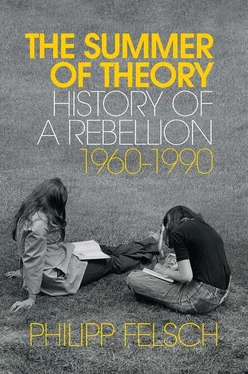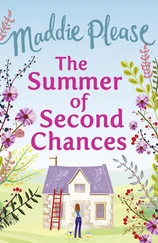In the depressing post-war atmosphere of 1950s Germany, Adorno made it plain that there was ‘no longer anything harmless and neutral’: his diagnosis of a society paralysed to death stood against the backdrop of the German genocide. 17Elsewhere, he wrote about the primal scene of the ghostly life: ‘In the concentration camps, the boundary between life and death was eradicated. A middle ground was created, inhabited by living skeletons and putrefying bodies.’ 18Images like these must have conjured up childhood memories in Peter Gente. Towards the end of the war, prisoners from a nearby labour camp had turned up in his home town of Halberstadt. Children passed around the rumours of underground factories where these figures assembled aircraft – their parents said not a word about them. In return, Gente said nothing about his parents for the rest of his life. The rupture – precipitated not least by his reading of Adorno – was too deep for him to accord them any importance beyond rejection. As a result, only a few isolated facts are known about them. Gente’s father was a lawyer who had served as a lieutenant on the Eastern front and had been taken prisoner by the Red Army. His mother, from a ‘very anti-Semitic family’, contributed that heritage to the marriage. Gente remembered helping his mother carry his paralysed grandmother to the basement shelter during an air raid that destroyed large parts of Halberstadt in April of 1945. The family’s big house on the outskirts of the city was not hit. But when Gente’s father returned from Russia six years later, his career was ruined: a former member of the Nazi Party had no hope of advancement in the legal bureaucracy of East Germany. A short time later, the family had to flee to the West – allegedly because the father’s contacts with the American intelligence service had been exposed. 19
Along with an initially small but later fast-growing number of his generation, Peter Gente made Minima Moralia his breviary: a book that was digestible only in small portions, but one that could be consulted in every circumstance. The dons of German universities did not know what to make of Adorno’s ‘painfully convoluted intellectual poetry’, as Thomas Mann once called the book. 20As a result, the influential reading experiences were extramural. 21Later, Gente the publisher would insist on making ambulatory books – readable on the train, ‘while travelling’ or around town – no doubt influenced by his experience as an Adorno reader. 22‘I carried Minima Moralia around with me for a good five years. Every day, always with me, a regular vade mecum.’ 23With his melancholy diagnosis of the present, Adorno instituted a new use for philosophy: his books replaced the volume of poetry in the young reader’s coat pocket.
Like Thomas Mann, the first critics to review Minima Moralia in the fifties pointed out its poetic character. They either revealed the book to be ‘secretly a lyric poem’, or attested that ‘only a musician’ could have composed it. 24Adorno himself later claimed, in an interview in Der Spiegel , to be a ‘theoretical person who feels that theoretical thinking comes extraordinarily close to his artistic intentions’. 25This was no doubt the reason for the book’s great success: it catered for the poetic demand of the post-war period. In the same year in which Minima Moralia was published, Gottfried Benn noted that the poets had triumphed over the philosophers. Even the philosophers, he declared in his 1951 Marburg lecture on ‘Problems of Lyric Poetry’, now longed to write poems. ‘They feel that systematic, discursive thinking has reached an impasse at the moment; consciousness can bear at the moment only something which thinks in fragments; five hundred pages of observations on truth, apt though some sentences may be, are outweighed by a three-verse poem.’ 26If this diagnosis is correct – and the number of new poetry magazines emerging in the 1950s suggests that it is – then Adorno and his philosophical aphorisms were aligned with the trend of the time.
Adorno himself would by no means have wanted his work to be misunderstood as a prose poem, however. He is known to have rejected philosophers ‘borrowing from literature’ and expecting ‘that Being itself will speak in a poésie concocted of Parmenides and Jungnickel’, and decried the resulting language as a ‘jargon of authenticity’. 27But Adorno went further: in a world which had passed through an apocalypse, he saw no future for poetry itself. After Auschwitz, in his notorious dictum – also dated 1951 – writing poems was a barbaric act. 28Was he carrying this idea to its logical conclusion in Minima Moralia ? Was the book a subversion of the poetic form by discursive philosophy? 29Adorno was smuggling a work of social analysis full of difficult philosophical references into his readers’ reach by disguising it as literature. As the sixties progressed, they took the bait. Although Gente continued to read novels, he no longer read them as edifying tracts. Michael Rutschky, who discovered Minima Moralia a few years after him, wrote that Adorno’s texts made ‘literary writing seem completely anaemic compared with philosophy’. 30Ten years after Gottfried Benn’s premature declaration of victory, different circumstances prevailed: ‘theory’ – now in the singular as a mass noun – had so thoroughly co-opted poetry that it was in the process of superseding it.
Culture after Working Hours
With Minima Moralia as a pocket compass, Gente set off into the sixties. The young German intellectuals of that time wore Caesar bangs and simple clothes, and demonstrated their nonconformism by listening to jazz. Their attitude towards life had existentialist foundations, and Adorno’s ‘teaching of the good life’ gave it a flavour of social critique. 31‘Even the blossoming tree lies’, they read, ‘the moment its bloom is seen without the shadow of terror.’ And: ‘For the intellectual, inviolable isolation is now the only way of showing some measure of solidarity.’ 32The dismay that sentences like these elicited in their readers is difficult to understand today; they sound oddly melodramatic to ears accustomed to the varieties of postmodern irony. Hence, it is with nostalgia that Michael Rutschky recalls the years when the world was still ‘in perfect disorder’. With a little practice, Adorno’s readers learned to apply his conceptual toolbox to situations of day-to-day life – at the risk of acting smugly superior. 33No wonder Adorno, returning from exile, seemed to many older Germans like an avenging angel. His ‘fiercely brilliant’ thinking was all the more influential among the younger generation. 34
Written in exile in California in the mid-1940s, Minima Moralia anticipated the post-war era’s misgivings about the young West German state. The exiled Polish writer Witold Gombrowicz, who spent 1963 in West Berlin as a guest of the Ford Foundation, seems not even to have known the book’s title, and yet the impressions he recorded in the divided city came surprisingly close to Adorno’s assessment. Gombrowicz looked out over the trees of the Tiergarten from his fifteenth-floor apartment in the Hansaviertel tower block, took a drive down the broad boulevards to Freie Universität, and marvelled at the concrete hair-dos of the ladies in the cafés on Kurfürstendamm. ‘City-spa, the most comfortable of all the known cities, where cars move smoothly without traffic jams and the people move smoothly, unhurriedly, where crowds and stuffiness are almost unknown.’ Yet the cool modernism and the ahistorical atmosphere that surrounded the author instilled in him a certain anxiety. ‘Death sat on my shoulder, like a bird, throughout my entire stay in Berlin’; terrible forebodings emanated from overgrown ruins. ‘Only the everyday and the trifle’, Gombrowicz wrote of the city where he contracted a heart ailment, ‘are diabolical.’ 35
Читать дальше












